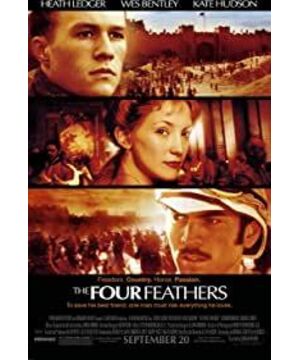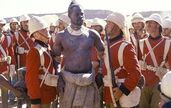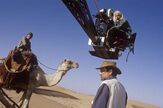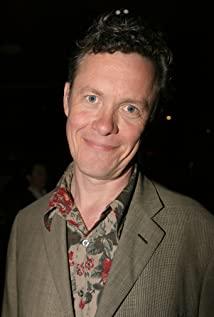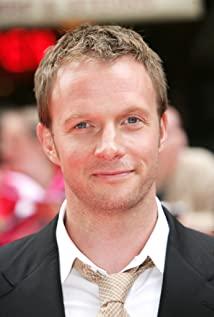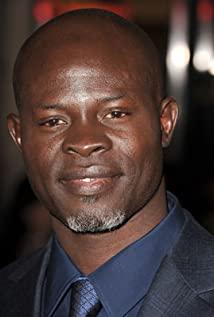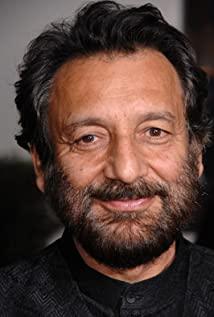The protagonist of the film, Harry, is a noble officer who joined the army because his father was a famous soldier, and he never really liked it in his heart. Finally, when the war really came, he chose to resign out of fear. And because of this, he was regarded as a coward by his family and friends. In my opinion, this kind of behavior itself is a kind of courage, the courage to admit and face it. Look at his era. In the 60 years of Queen Victoria's reign, the idea of empire has completely penetrated into the hearts of all British people, and in high society, fighting for the Queen and the Empire is "every man can do it." most honorable thing." In the context of such a strong discourse, and then connecting with Harry's military family background, it takes a lot of courage and determination for him to speak out his fears frankly. Even when his fiancée thought he made the decision because of her, Harry didn't choose to adopt this reason, which was obviously more acceptable to society, but told his lover directly: "It's not because of you, it's because of me. Scared." It takes courage to be honest.
Then what? Is acknowledging fear a reason to avoid responsibility? At the Battle of Waterloo, the Duke of Willington pointed to a soldier in his army and said loudly to the officer beside him: "Look, what a brave soldier! Although he was pale with fright, he was still charging bravely!" Bravery when one does not know fear is only "the ignorant fearless", and the pride of borrowing alcohol to strengthen courage is only a temporary surge of blood. In the film, what ultimately drives the protagonist to embark on the road of self-redemption is the external pressure and internal calling as a moral existence. In the process, he was still terrified. In the prisoner of war camp, he said to his native friend Abou: "I have no reason to live. I am still afraid." Abou replied: "The fear is always there." But The desire for dignity and honor made him insist, and the meaning of action developed from washing away the shame (returning those four feathers) to finding himself. When Harry came back from the battlefield and saw Rethn, she took the initiative to ask him for the feather he gave him back, and Harry replied, "That's not the reason why I came back." At this time, Harry no longer needed to prove his courage to others. , he has proved to himself.
In this process, two points are worth noting. First, it is morality, not law, that exists as external pressure. I remember chatting with a friend who is enthusiastic about NGOs. She insisted that there should be legislation for behaviors such as taking the initiative to make way for the old, the weak, the sick and the disabled on the bus; and I said: the law can only be used to punish evil, not It is used to promote goodness, because doing so will most likely lead to excessive intrusion into private space. Although the senior officer in the film was angry after receiving his resignation, he only ordered Harry to leave the barracks immediately, rather than forcing him to stay in the name of the law. It was an acknowledgement of personal choice, and Harry had the right to opt out, for whatever reason. Second, since morality is non-coercive, in order for it to function, it must respond to the inner calling of the individual, in other words, the morality is internalized. Glory and dignity have always been common words in the Western classical context. As a transcendental existence, they endow individual behavior with positive meaning. At the beginning of the movie "Gladiator", what the Roman cavalry shouted when charging was: Roman Glory! Conversely, if the connotation of morality is a hypocritical sublime, it must not be far away, and it will not be far away. Wang Xiaobo mentioned in an article that he summed up his years of experience and found that there are two kinds of people in the world he lives in: those who write scripts for life and those who live according to this script. Clearly in such a world, morality does not constitute an inner calling, and therefore does not give one the courage to act.
There is also an important character in the film, Harry's friend Jack, who has been secretly in love with Harry's fiancee Rethn but can only accept the reality. Towards the end of the film, Jack confesses to Harry that his bravery on the battlefield is just to prove to her that he is a better soldier. At this time, he showed the same courage as Harry, and did not choose to give his actions a grand meaning more in line with the background of the times, and faced the "smallness" under his military uniform.
What's interesting is that whether it was Harry's change from being a deserter to finding himself, or Jack's resolute decision to break up his engagement with Rethn after knowing that Harry had saved him, the film did not deliberately exaggerate the process of his thought change or " The complex self-struggle of fighting private words for a flash" obviously takes the moral basis behind this behavior for granted without questioning, and this is the embodiment of the deep internalization of morality in people's hearts.
Unlike this kind of courage with clear moral guidelines, another character in the film, an aboriginal from a slave tribe, the aforementioned Abou, shows more simple and authentic courage. Abou met a dying Harry in the desert, thinking it was God's arrangement, and took responsibility for his life seriously. From reporting to the British Army, to saving Harry from a prisoner of war camp, Abou showed tremendous courage and strength. From the film, I can hardly find any real-world reason for his behavior. At the end of the film, when he breaks up with Harry, Harry asks him what he plans to do in the future, and Abou replies that he is going to do "Whatever God has chosen for me to do". I don't know if the director is implying that there is a courage like Abou's The power of religious belief, but this manifestation of courage is undoubtedly spontaneous rather than conscious, and thus more mysterious and fascinating. Abou didn't understand Harry's actions at first. He didn't understand why he risked his life to rescue a comrade who was probably dead after he had already proved that he was not a coward. He could only say "You English walk proudly on the earth." ". After witnessing Harry's determination and bravery, Abou apparently accepted the courage that came from a moral call greater than spontaneous courage, and finally helped Harry and his comrades escape together. This triumph of civilized courage over primitive courage is featured in many films that reflect the Greco-Roman era. In "The History of the Decline and Fall of the Roman Empire", the Roman officers who came to persuade capitulation because of their firm and noble beliefs never said a word when they were tortured by the fire despite all the pain, and finally influenced the stubborn and brave Germanic barbarians; Alexander the Great started his far-flung eastward expedition with the desire to spread Greek civilization to the world.
View more about The Four Feathers reviews


